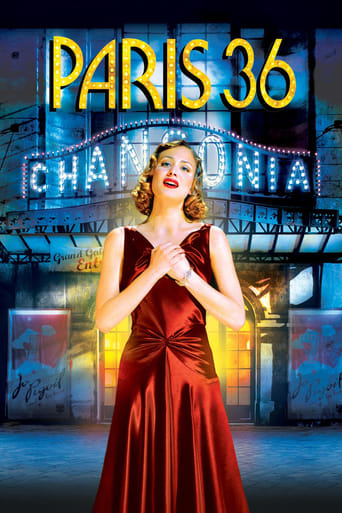krzysiektom
A very nice cinematic experience. Everything was top notch - direction, script, acting, singing, scenography and costumes. The film leaves a warm feeling despite presenting many dark sides of life in Fauborg (outskirt of Paris) in the 1930s, like fascism, workers' strikes, unemployment, marital betrayal, loneliness. The director incredibly managed to mix pathos and sentimentality with sarcasm and sardonic humor in the same scenes, which prevented the film from being corny. Includes probably the best written funeral scene ever in my opinion. The songs are not remarkable, with one exception - a song about love where the main female character is virtually declaring love to a man from the stage. The female is a revelation, talented and beautiful young actress with good singing voice. I will gladly watch the film again.
Amy Adler
Pigoil (Gerard Jugnot) runs a small vaudeville like theater, the Chansonia, in the Faubourg section of Paris. His wife is a "star" of the theater and the rest of the performers are a tight-knit group. Perhaps, too close, for Pigoil is given a double whammy one day. First, his wife has been sleeping with not one, but, two of the other troupe members and, even more sadly, the owner of the building can not pay his debts (it is the depression everywhere) and commits suicide. Soon, Pigoil and his young, idolized son Jojo are barely scraping by. But, then, Pigoil makes a deal with the Fascist like gentleman who truly runs the neighborhood. Can his show group have one month to make the theater profitable again? The ruthless man agrees to give them a chance, for he has his eye on one of their newest performers, a beautiful young singer named Douce. Will the Chansonia become successful once more? This is an unusual look at life in the depression, for it has a French setting, where fascism was brewing in neighboring Germany and in France. There are many subplots to the main one, including one of an agoraphobic music teacher, residing across from the Chansonia, who was once a leading song writer and who has an unlikely connection to Douce. Needless to say, the recreation of the former theater district is very fine, as are the costumes, the cast, the story, and the direction. Therefore, if you like foreign films and unusual tales, put this on your list for future viewing. It is a fine example of quality French cinematic achievements.
jdesando
I may have seen one of the last musical hall revivals in London a few years ago on The Strand—it was full of tinny song and dance that made you tap your feet and long for the good old days of vaudeville and innocence. The telly has pretty much killed that simple pleasure, but Paris 36, a melodramatic story of the revival of a Chansonia in northern Paris, 1936, revives the joy of ensemble acting and dancing, original music, and the intrigue so much a part of the lively arts when they become business and pleasure.Three Parisians undertake saving a music hall in their section of Paris called Faubourg using the talents of a star-crossed couple supplying the on and off stage romance. The intrigue is much less than Cabaret's; the nostalgia is more than Cinema Paradiso's; it's all more Moulin Rouge than Amelie. The songs are fetching, made especially for the film, and the plot is pure cliché right down to the lecherous businessman and cute ingénue.The background is unmistakably fascist versus socialist, owners battling workers for a depression-era slim slice of the economic pie and soul. Paris 36 risks it all with formulaic intrigue and predictable denouement. Yet throughout is a good cheer, a bel canto breeziness that draws you in to song, dance, history, and politics, never too heavy, light enough to make you wish that music hall still stood on The Strand.
daphne4242
This is a beautiful film which captures much of the feel of great French films of the 1930's. It's also a love poem to Paris. It helps that Nora Arnzeder is so gorgeous and all the actors give strong performances. The story is really a fairy story with a political twist. A small music hall in Paris is forced to close down in 1936. Because this is is the year of the Popular front in France, when factory occupations spread across the country, the performers decide to take over the theatre and run it themselves. They get an extraordinary stroke of luck when a young girl, Douce, turns up hoping to get a break in the theatre. Double luck because not only is she a brilliant performer but the local boss fancies her and allows the theatre to stay open. There are some serious themes touched on, including the pervasive anti-Semitism of the extreme Right at this period but the film is overwhelmingly joyous, which is as it should be. The Popular Front didn't happily, which was a tragedy for France, but this film does, as do all good fairy tales.



